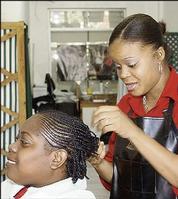Trudy Simpson, Staff Reporter

Mian Gordon working on the hair of her business partner, Janet Goodall. - NORMAN GRINDLEY/STAFF PHOTOGRAPHER
USING A backyard barber or hair salon may not necessarily improve your appearance. Public health specialists say these unlicensed establishments can give persons scalp and skin fungal infections such as ringworm. This is because some salons may be engaged in unhealthy practices.
Many barbershops and beauty salons are registered and follow standard practices. But public health officials say there are others which are unlicensed and put the public at risk by operating below the required standards.
"The Public Health Department has a problem with backyard barbers," said Dr. Herb Elliott, medical officer of health for Kingston and St. Andrew. He was speaking at the Gleaner Editors' Forum, held earlier this month.
BACKYARD BARBERS AND HAIRDRESSERS
"We have tineas (ringworms) in children's hair that are costing us millions of dollars in schools to clear up," he said. "We would like to not have to pay the millions to clear this up, but the fact is that we cannot control backyard barbers and hairdressers. We don't even know where they exist in the first place."
Some establishments fail to sanitise implements and many even use the same comb or other styling instrument on several customers. In addition, public health specialists say there are a number of practitioners who have not been trained and know nothing about bacteria.
Some shops have no hand-washing facilities and the barbers and hairdressers fail to wear protective gear such as overcoats or give customers protective gear, they said.
Concerned about the growth in the beauty industry and the risks that may accompany this, the ministries of Health and Local Government and the parish councils have teamed up to introduce new regulations governing the licensing, professional requirements and health and safety standards for the beauty industry.
URGED TO BECOME COMPLIANT
The new regulations, which took effect last May, are the Public Health (Barbers and Barbershops) Regulation 2004 and the Public Health (Hair-dressers, Beauty Therapists including spa operators, Cosmetologists and Beauty Salons) Regulation 2004. They replace 1941 regulations, which only addressed barbers and barbershops.
Current estimates put the number of establishments islandwide at around 2,600 and the number of professionals at around 7,000 to 8,000 individuals.
That number is underestimated, said Calvert Thomas, the Local Government Ministry's director of revenue enhancement. He said, "We are encouraging everybody to become compliant."
A press release on the issue indicated that the new regulations require professionals to prove their skills and education in their trade and to meet health and sanitation standards in their shops. They must also show they can protect customers from potential health hazards such as communicable diseases and harmful products.











